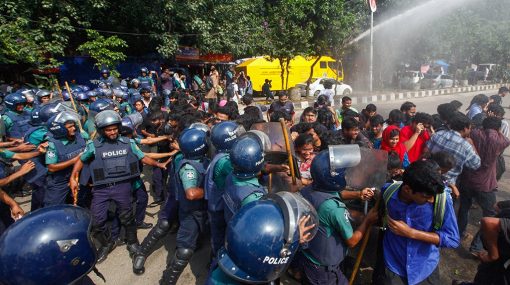
More than 60 Bangladeshi activists, academicians from universities across the world, lawyers and artists have issued a signed statement condemning the Bangladeshi government’s crackdown on student protesters and “illegal abduction” of the 63-year-old renowned photographer and social activist, Shahidul Alam.
In another statement issued by Arundhati Roy, Noam Chomsky, Naomi Klein, Eve Ensler and Vijay Prashad, the renowned global academicians and activists noted that “documentation and criticism are elementary aspects of human life. For a state to deny a citizen the right to say what is happening and to be angered about what is happening is a denial of this basic right.”
Calling for the immediate release of Alam and detained students, the statement read, “anything less than that stands as a rebuke to justice and liberty, decency and hope for a better future.”
According to reports, around 22 students from East West University, North South University, Southeast University, and Brac University are currently lodged in jail. Calling for the release of all journalists and students who have been arbitrarily arrested, the statement by Bangladeshi activists and academicians read “it has been further reported widely in the media that numerous innocent students are being subjected to torture in police custody and remand as well as various forms of harassment and intimidation whereas those allegedly responsible for imposing violence upon a non-political and peaceful movement of the young students are enjoying impunity.” The statement demanded an investigation into the “unlawful arrest and torture” and an end to the government repression.
Alam was covering the protests by tens of thousands of students demanding implementation of road safety measures after two teenagers were killed in an accident. While reporting on the brutal crackdown that was unleashed on the protesting students who were assaulted both by police forces and the student and youth wings affiliated with the ruling party, he was allegedly attacked by pro-government activists who broke his camera. Alam survived the attack without injuries.
Speaking to Al-Jazeera on Sunday, he criticized the government for not yielding to the legitimate demands of the protesting students. Hours later, several men in civilian clothes barged into Alam’s apartment and abducted him. Speaking at a press conference in Dhaka, his partner Rahnuma Ahmed said, “I was not in the flat, but I heard a scream and I ran down to find out… We heard from the security guards and our landlord that [Alam] had been forced into a car. There have been about 30 to 35 men in a plain dress. They had forcefully taken away the CCTV camera footage, they put Scotch Tape on the CCTV camera.”
After initially denying that he was arrested, the police later admitted that he was in their custody. He was charged under the notoriously misused section 57 of the Information Communications Technology (ICT) Act – which allows the government to charge people on the vague charges of damaging the image of the state in electronic media. He is now placed on a seven-day remand.
When he was produced in the court, he was reportedly unable to walk by himself. “I was hit. They washed my blood-stained clothes and then made me wear them again.. I was not given access to any lawyer during detention”, Alam claimed. The signatories of the statement said, “If anything he has done is considered against the law charges could be brought in the due process, but nothing justifies unlawful abduction, arbitrary remand and especially unconstitutional torture in custody.”
This ICT act, introduced in 2006, has since been systematically used by the Bangladeshi government to crack down on the freedom of expression of dissenting voices. Recently 20 journalists had been charged under the same law. Alam, however, is a high-profile journalist who had his works of photography published in the Guardian, New York Times, Time magazine and National Geographic in a career that has spanned over four decades. He is also highly respected as the founder of Drik gallery and the Pathshala South Asian Media Institute in Dhaka – two premium institutions that have trained hundreds of photographers in the region.
First published in Peoples Dispatch. Republisher here from Newsclick.




